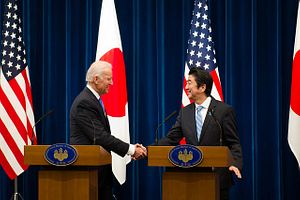Japanese Prime Minister Shinzo Abe managed to increase his electoral majority in Japan’s lower house in elections held earlier this month. Although historically low turnout diminished the potency of Abe’s “mandate” from the people, the LDP politician can be forgiven for using his fresh – indeed, crushing – electoral victory as justification to press ahead with some controversial policies in the immediate- term. Yet Abe’s convincing showing at the polls also portends some important implications for long-term Japanese politics, particularly with respect to Japan’s role in the world.
Abe called snap elections amid criticism of his divisive economic reforms, dubbed Abenomics. Aided by the largely lackluster showing of the opposition parties, the prime minister was able to win the day in conclusive fashion: his right-of-center Liberal Democratic Party won 291 seats in the House of Representatives, well over the 238 needed for a parliamentary majority. Combined with the seats taken by coalition partners Komeito, this haul gives Abe’s government a commanding 326 seats (over 68 percent of the total) in the new-look lower house. The LDP-Komeito coalition already wields a solid majority in the House of Councilors, Japan’s upper house, which is elected separately.
Nearly half of eligible voters declined to vote in the recent elections, which for some onlookers points to a worrying trend of disengagement and disillusionment among the Japanese electorate. But by far the most significant trend in historical terms is the fact that the LDP has seemingly managed to weather what once looked like a formidable challenge to its hegemony in Japanese politics. Barring a brief spell of fragile coalition governments during the early- to mid-1990s, the LDP governed Japan continuously between 1955 and 2009, exerting a steady and predictable influence over the direction of East Asia’s largest economy. In recent years, however, an insurgent force in Japanese politics – the Democratic Party of Japan – had threatened to break the LDP’s dominant party status, wresting the premiership from the LDP’s grip between September 2009 and December 2012.
Two years ago, Abe smashed the DPJ by grabbing around three quarters of its parliamentary representation in an acrimonious political atmosphere. Once touted as a permanent counterweight to LDP dominance – a mainstay of a new two-party system for Japan – the DPJ was reduced to a rump. In this month’s election, the DPJ managed only a modest gain of 11 seats. It looks doubtful that the DPJ will recover its status as a viable party of government any time soon. More likely than not, the grouping will instead play the less grandiose role of permanent minority party in Japanese politics – a role hitherto exemplified by the Japan Socialist Party (JSP) during the so-called 1955 (party) system.
For better or worse, the return of the LDP to a position of untrammeled dominance should herald a renewed era of predictability and stability in Japanese politics. This is especially true in terms of foreign policy. Brief interludes notwithstanding, LDP politicians have been the architects of Japanese grand strategy since 1955, always pursuing a conservative vision for Japan on the world stage. In the early Cold War, this meant shrewdly hewing to the Yoshida Doctrine – a grand strategy of relying on the United States for external security while devoting Japan’s scarce national resources towards the ends of economic development.
Later in the Cold War, LDP politicians sanctioned the slow and steady reform of Japan’s postwar global posture. From quietly boosting defense expenditure to more publicly endorsing an expansion of the role of the Japan Self-Defense Forces, successive LDP governments pursued a conservative strategy of updating Japan’s military policies to fit the times – in particular, to meet exigencies posed by external threats from the East Asian mainland (especially the Soviet Union, China, and the North Korea) but also in response to the waxing and waning U.S. security guarantee to Japan. The party’s near-monopoly on both executive and legislative power meant that such strategic adjustments could be pursued over and above the vocal protestations of opposition parties like the JSP.
With the LDP appearing to once again tighten its grip on the reins of domestic power, the latest installments of conservative foreign policy reform can safely be put into action by Abe’s government: increased investment in military forces; a massaging (or even a complete overhaul) of the Japanese constitution to allow for an ever more robust and assertive role for Japan’s military; and a clarification of Japan’s legal right to participate in the collective security of its allies even when the Japanese homeland itself is not under attack. Abe himself has tended to infuse these reforms with a vocal and bullish expression of Japanese nationalism, a trend that also looks set to continue – if not intensify – in the wake of this latest election.
In the end, all successful foreign policies rely upon stable domestic-political foundations. For many years, the LDP’s dominant party status in Japanese politics constituted the impenetrable foundation needed to carry the nation’s careful navigation of Cold War geopolitics. Today, a resurgent LDP under Shinzo Abe appears to be laying the groundwork for a new phase in the readjustment of Japanese foreign policy. A more “normal” Japan beckons, critics having either been silenced or rendered impotent by the LDP’s gargantuan parliamentary majorities. Whether or not all of this is well received across the Sea of Japan and East China Sea, of course, is another question altogether. But there should be little doubt about the sort of foreign policies that Japan is now set to deploy.
Peter Harris is a Visiting Lecturer in Politics at Earlham College and a fellow of the Clements Center for History, Strategy and Statecraft at the University of Texas at Austin. You can follow him on Twitter @ipeterharris.

































